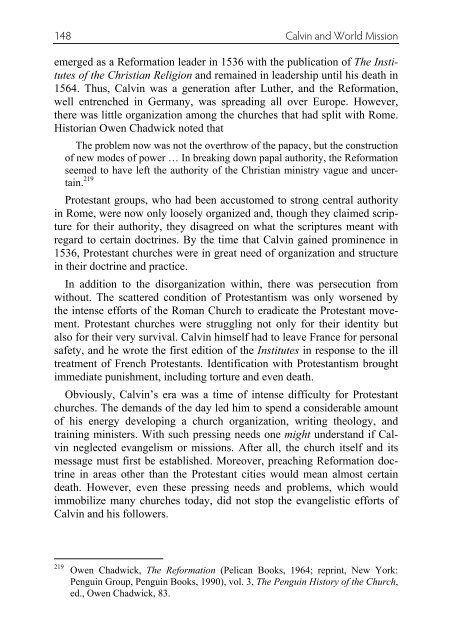Calvin and Missions - World Evangelical Alliance
Calvin and Missions - World Evangelical Alliance
Calvin and Missions - World Evangelical Alliance
You also want an ePaper? Increase the reach of your titles
YUMPU automatically turns print PDFs into web optimized ePapers that Google loves.
148 <strong>Calvin</strong> <strong>and</strong> <strong>World</strong> Mission<br />
emerged as a Reformation leader in 1536 with the publication of The Institutes<br />
of the Christian Religion <strong>and</strong> remained in leadership until his death in<br />
1564. Thus, <strong>Calvin</strong> was a generation after Luther, <strong>and</strong> the Reformation,<br />
well entrenched in Germany, was spreading all over Europe. However,<br />
there was little organization among the churches that had split with Rome.<br />
Historian Owen Chadwick noted that<br />
The problem now was not the overthrow of the papacy, but the construction<br />
of new modes of power … In breaking down papal authority, the Reformation<br />
seemed to have left the authority of the Christian ministry vague <strong>and</strong> uncertain.<br />
219<br />
Protestant groups, who had been accustomed to strong central authority<br />
in Rome, were now only loosely organized <strong>and</strong>, though they claimed scripture<br />
for their authority, they disagreed on what the scriptures meant with<br />
regard to certain doctrines. By the time that <strong>Calvin</strong> gained prominence in<br />
1536, Protestant churches were in great need of organization <strong>and</strong> structure<br />
in their doctrine <strong>and</strong> practice.<br />
In addition to the disorganization within, there was persecution from<br />
without. The scattered condition of Protestantism was only worsened by<br />
the intense efforts of the Roman Church to eradicate the Protestant movement.<br />
Protestant churches were struggling not only for their identity but<br />
also for their very survival. <strong>Calvin</strong> himself had to leave France for personal<br />
safety, <strong>and</strong> he wrote the first edition of the Institutes in response to the ill<br />
treatment of French Protestants. Identification with Protestantism brought<br />
immediate punishment, including torture <strong>and</strong> even death.<br />
Obviously, <strong>Calvin</strong>’s era was a time of intense difficulty for Protestant<br />
churches. The dem<strong>and</strong>s of the day led him to spend a considerable amount<br />
of his energy developing a church organization, writing theology, <strong>and</strong><br />
training ministers. With such pressing needs one might underst<strong>and</strong> if <strong>Calvin</strong><br />
neglected evangelism or missions. After all, the church itself <strong>and</strong> its<br />
message must first be established. Moreover, preaching Reformation doctrine<br />
in areas other than the Protestant cities would mean almost certain<br />
death. However, even these pressing needs <strong>and</strong> problems, which would<br />
immobilize many churches today, did not stop the evangelistic efforts of<br />
<strong>Calvin</strong> <strong>and</strong> his followers.<br />
219 Owen Chadwick, The Reformation (Pelican Books, 1964; reprint, New York:<br />
Penguin Group, Penguin Books, 1990), vol. 3, The Penguin History of the Church,<br />
ed., Owen Chadwick, 83.

















